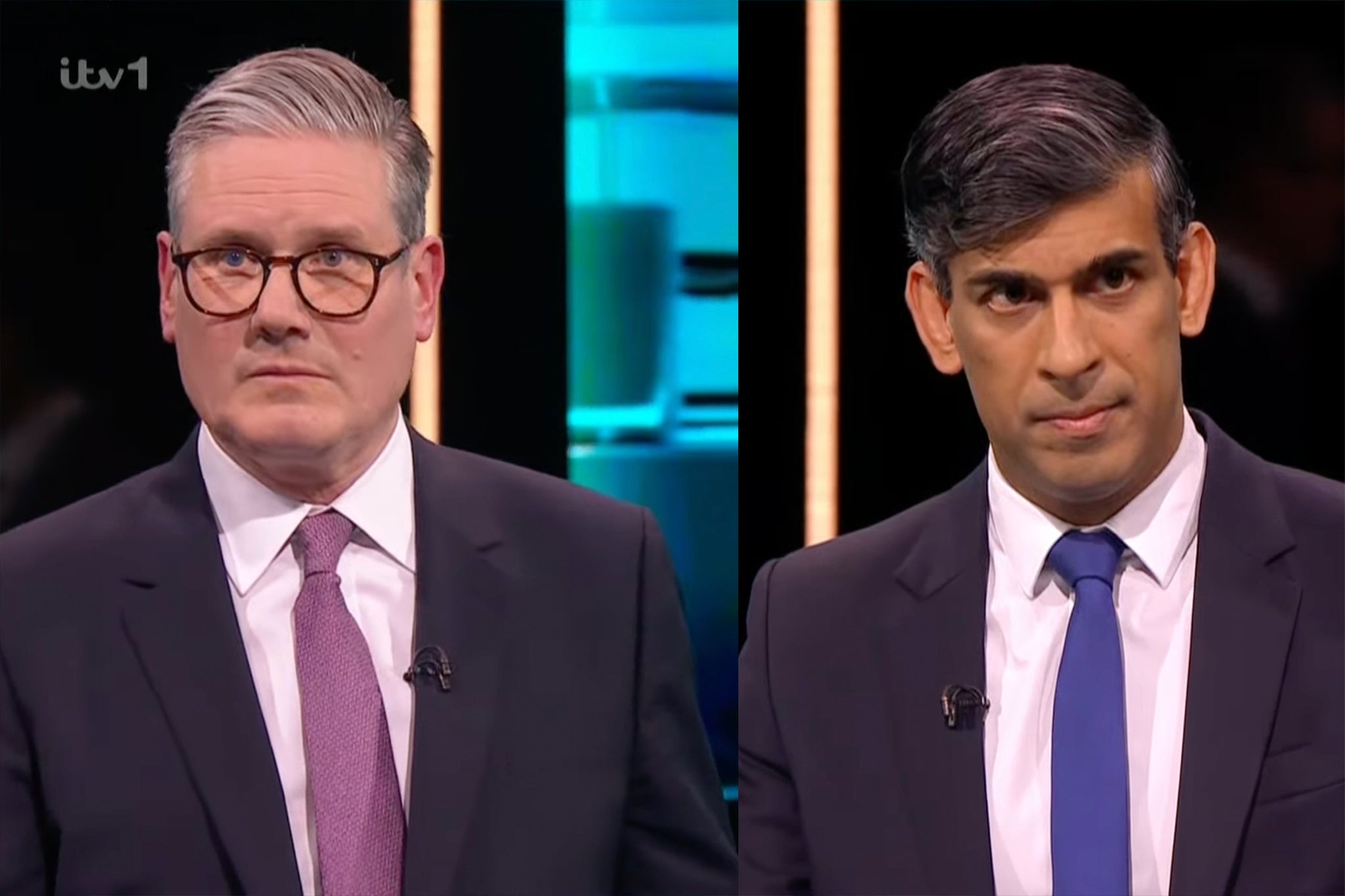Labour took a risk calling Sunak a liar – but come polling day, it will pay off
More voters will remember Rishi Sunak’s lie than the false claim that Labour might raise taxes – but both parties have a lesson to learn when they unveil their manifestos next week, warns Andrew Grice


To promote their misleading claim Labour would increase taxes on working households by £2,000, the Conservatives issued a video of a flying red piggy bank and the message: “If you think Labour will win, start saving…”
Labour replied with an ad showing Rishi Sunak with a blue piggy bank, saying he “just can’t stop telling porkies”.
Labour added that Sunak “lied about NHS waiting lists. Lied about the cost of living. Lied about small boats. What else is he lying about?”
Crucially, Labour made Sunak’s claim in Tuesday’s ITV debate a question of his character and ran another video showing pictures of lockdown parties in Downing Street. “They lied to you then. He’s lying to you now,” it said.
I think the Labour counterattack is more powerful than the Tories’ original claim, which has been further undermined by criticism from the Treasury’s top civil servant and the independent Office for Statistics Regulation.
Although many voters assume politicians lie (as the "Bliar" posters after the Iraq war showed), it is unusual for politicians to accuse each other of doing it. True, Jeremy Hunt did so last month when he hit back at Labour’s claim that Tory plans to eventually abolish national insurance would put the state pension at risk.
But use of the L-word is rare; politicians know that a shouting match in which both sides accuse each other of lying turns off many voters. Their rough trade has some rules. MPs are not allowed to use the word in Commons debates. When they are guilty of deliberately misleading parliament, it is a big deal, as Boris Johnson discovered. His Partygate lies cost him his premiership and he stood down as an MP to dodge a humiliating 90-day suspension.
The spin doctors’ unwritten playbook says “We can spin – but we can’t lie”, as they have no credibility with journalists once caught out. So they resort to non-denial denials and phrases like “I am not aware” and “We have no plans”, which Labour deploys when asked about tax rises.
Why did Labour break with tradition to brand Sunak a liar? Partly because Keir Starmer was inexplicably slow to rebut the claim during the TV debate, as he now recognises in private. One theory in Labour land is that the former human rights lawyer was mentally in a courtroom and waiting his turn to speak – unlike Sunak, who repeatedly interrupted Starmer and the moderator Julie Etchingham.
Labour judged the tax allegation was so dangerous that it had to hit it hard. The party could have created a row about Sunak’s inaccurate suggestion the £2,000 figure was approved by “independent Treasury officials”, but a Westminster village debate about the civil service’s role would have been a yawn for most voters. It could have focused on the Tories’ unfunded spending plans but that would have left Sunak’s claim on the table.
Challenging the allegation head-on was not without risk. Labour chose to ignore the lesson of the 2016 EU referendum. Dominic Cummings admitted later his Leave campaign’s claim that Brexit would deliver £350m a week for the NHS was a deliberate trap for the Remain camp, which walked into it by challenging the figures and magnifying the dodgy claim.
The Tories are doubling down on their tax allegation, and Labour knows some voters will believe it. The slanging match risks deepening the public’s lack of trust in politicians generally – which, Starmer fears, hurts Labour as well as the Tories. “One barrier to voting for us is ‘You’re all the same’ and so we wouldn’t make a difference,” one shadow cabinet member told me.
But, on balance, I think Labour was right to hit Sunak’s claim hard.
While the Tories repeat the £2,000 claim in every speech, interview and press release, Labour brands Sunak a liar in every utterance. Crucially, Labour can now bracket Sunak with Johnson, helping it to make the election a referendum on 14 years of Tory rule rather than on whether Starmer and Labour are fit to govern, as the Tories want. As one Starmer ally put it: “Some people will swallow the lie, most will think it’s just politics, and others will think Sunak is another Boris Johnson.”
I suspect most voters will remember Sunak’s lie rather than the claim that Labour might raise taxes. Most of the media, including the BBC, is rightly describing the allegation as dubious. In his desperation to land blows on Labour, Sunak has wrecked any hopes of restoring the tarnished reputation of the Tories, once seen as “the natural party of government”, and made the man they love to call "Sir Slippery" look more trustworthy than them.
Although they won’t admit it, this week’s lying game offered both the Tories and Labour a diversion from their conspiracy of silence over the need for post-election tax rises to safeguard public services – and the £23bn a year of tax increases already in the pipeline, according to a report by the Resolution Foundation think tank published today. Both parties make spending pledges with funny money such as reducing tax avoidance, which is not bankable.
A little more honesty would be welcome when the parties unveil their manifestos next week. Pigs will fly.





Join our commenting forum
Join thought-provoking conversations, follow other Independent readers and see their replies
Comments